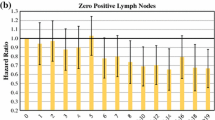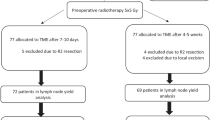Abstract
Background
Accurate pathologic staging has been shown to correlate with outcome in rectal cancer. Because the exact number of examined lymph nodes (LNs) may vary with preoperative therapies, our objective was to measure the impact of neoadjuvant radiation on LN number for rectal adenocarcinoma.
Methods
Patients who underwent curative-intent radical surgery for rectal adenocarcinoma in Los Angeles County (LAC) were identified from the Cancer Surveillance Program (CSP) of California (1988–2006). Patients were grouped according to receipt of radiotherapy (neoadjuvant or none), and the number of examined LNs was assessed.
Results
Query of CSP identified 2,727 patients meeting eligibility criteria; 70 and 30 % of patients received no radiotherapy or neoadjuvant radiotherapy (NRT), respectively. When comparing LNs, a lower mean number was observed in the neoadjuvant group than the no-radiation group (7 vs. 8.9 LNs, respectively; p < 0.001). When matching the cohorts for age and sex, the neoadjuvant group still had fewer examined LNs (7.1 vs. 9.8, respectively, p < 0.001). In patients who received NRT, no optimal LN number was associated with improved survival. However, on subset analysis of patients with N0 disease, a LN number of ≥8 was associated with best rates of 5 year and overall survival.
Conclusions
Within the LAC population, we observed a lower number of LNs retrieved in patients receiving radical surgery for rectal cancer than guideline recommendation. This number is reduced further in those who received NRT independent of age and sex. Our results highlight the limitations in adhering to minimum LN requirements for rectal cancer when NRT is provided.

Similar content being viewed by others
References
Sauer R, Becker H, Hohenberger W, et al. Preoperative versus postoperative chemoradiotherapy for rectal cancer. N Engl J Med. 2004;351:1731–40.
Kapiteijn E, Marijnen CA, Nagtegaal ID, et al. Preoperative radiotherapy combined with total mesorectal excision for resectable rectal cancer. N Engl J Med. 2001;345:638–46.
Roh MS, Colangelo LH, O’Connell MJ, et al. Preoperative multimodality therapy improves disease-free survival in patients with carcinoma of the rectum: NSABP R-03. J Clin Oncol. 2009;27:5124–30.
Parfitt JR, Driman DK. The total mesorectal excision specimen for rectal cancer: a review of its pathological assessment. J Clin Pathol. 2007;60:849–55.
Edge SB. American Joint Committee on Cancer. AJCC cancer staging manual. 7th ed. New York: Springer; 2010.
Engstrom P, Arnoletti J, Benson AB 3rd, et al. NCCN clinical practice guidelines in oncology: rectal cancer. J Natl Compr Cancer Netw. 2009;7:838–81.
Enker WE, Thaler HT, Cranor ML, Polyak T. Total mesorectal excision in the operative treatment of carcinoma of the rectum. J Am Coll Surg. 1995;181:335–46.
MacFarlane JK, Ryall RD, Heald RJ. Mesorectal excision for rectal cancer. Lancet. 1993;341(8843):457–60.
Senthil M, Trisal V, Paz IB, Lai LL. Prediction of the adequacy of lymph node retrieval in colon cancer by hospital type. Arch Surg. 2010;145:840–3.
Norwood MG, Sutton AJ, West K, Sharpe DP, Hemingway D, Kelly MJ. Lymph node retrieval in colorectal cancer resection specimens: national standards are achievable, and low numbers are associated with reduced survival. Colorectal Dis. 2010;12:304–9.
Mekenkamp LJ, van Krieken JH, Marijnen CA, van de Velde CJ, Nagtegaal ID. Lymph node retrieval in rectal cancer is dependent on many factors—the role of the tumor, the patient, the surgeon, the radiotherapist, and the pathologist. Am J Surg Pathol. 2009;33:1547–53.
Ha YH, Jeong SY, Lim SB, et al. Influence of preoperative chemoradiotherapy on the number of lymph nodes retrieved in rectal cancer. Ann Surg. 2010;252:336–40.
Morcos B, Baker B, Al Masri M, Haddad H, Hashem S. Lymph node yield in rectal cancer surgery: effect of preoperative chemoradiotherapy. EurJ Surg Oncol. 2010;36:345–9.
Baxter NN, Morris AM, Rothenberger DA, Tepper JE. Impact of preoperative radiation for rectal cancer on subsequent lymph node evaluation: a population-based analysis. Int J Radiat Oncol Biol Phys. 2005;61:426–31.
Kim J, Sun CL, Mailey B, et al. Race and ethnicity correlate with survival in patients with gastric adenocarcinoma. Ann Oncol. 2010;21:152–60.
California Cancer Registry. California cancer registry visual editing standards: informational packet for cancer reporting facilities. 2008. http://www.ccrcal.org/PDF/infopack.pdf. Accessed 20 Apr 2012.
Bergstralh EJ, Kosanke JL, Jacobsen SJ. Software for optimal matching in observational studies. Epidemiology. 1996;7:331–2.
van Gijn W, Marijnen CA, Nagtegaal ID, et al. Preoperative radiotherapy combined with total mesorectal excision for resectable rectal cancer: 12-year follow-up of the multicentre, randomised controlled TME trial. Lancet Oncol. 2011;12:575–82.
Kapiteijn E, Kranenbarg EK, Steup WH, et al. Total mesorectal excision (TME) with or without preoperative radiotherapy in the treatment of primary rectal cancer. Prospective randomised trial with standard operative and histopathological techniques. Dutch ColoRectal Cancer Group. Eur J Surg. 1999;165:410–20.
Sprenger T, Rothe H, Homayounfar K, et al. Preoperative chemoradiotherapy does not necessarily reduce lymph node retrieval in rectal cancer specimens—results from a prospective evaluation with extensive pathological work-up. J Gastrointest Surg. 2010;14:96–103.
Perez RO, Pereira DD, Proscurshim I, et al. Lymph node size in rectal cancer following neoadjuvant chemoradiation—can we rely on radiologic nodal staging after chemoradiation? Dis Colon Rectum. 2009;52:1278–84.
Koh DM, Chau I, Tait D, Wotherspoon A, Cunningham D, Brown G. Evaluating mesorectal lymph nodes in rectal cancer before and after neoadjuvant chemoradiation using thin-section T2-weighted magnetic resonance imaging. Int J Radiat Oncol Biol Phys. 2008;71:456–61.
Wright FC, Law CH, Berry S, Smith AJ. Clinically important aspects of lymph node assessment in colon cancer. J Surg Oncol. 2009;99:248–55.
Scott KW, Grace RH, Gibbons P. Five-year follow-up study of the fat clearance technique in colorectal carcinoma. Dis Colon Rectum. 1994;37:126–8.
Parkash V, Bifulco C, Feinn R, Concato J, Jain D. To count and how to count, that is the question: interobserver and intraobserver variability among pathologists in lymph node counting. Am J Clin Pathol. 2010;134:42–9.
Prall F, Wohlke M, Klautke G, Schiffmann L, Fietkau R, Barten M. Tumour regression and mesorectal lymph node changes after intensified neoadjuvant chemoradiation for carcinoma of the rectum. APMIS. 2006;114:201–10.
Fajardo LF. Effects of ionizing radiation on lymph nodes. A review. Front Radiat Ther Oncol. 1994;28:37–45.
Wichmann MW, Muller C, Meyer G, et al. Effect of preoperative radiochemotherapy on lymph node retrieval after resection of rectal cancer. Arch Surg. 2002;137:206–10.
Marks J, Valsdottir E, Rather A, Nweze I, Newman D, Chernick M. Fewer than 12 lymph nodes can be expected in a surgical specimen after high-dose chemoradiation therapy for rectal cancer. Dis Colon Rectum. 2010;53:1023–9.
Caplin S, Cerottini JP, Bosman FT, Constanda MT, Givel JC. For patients with Dukes’ B (TNM stage II) colorectal carcinoma, examination of six or fewer lymph nodes is related to poor prognosis. Cancer. 1998;83:666–72.
Tepper JE, O’Connell MJ, Niedzwiecki D, et al. Impact of number of nodes retrieved on outcome in patients with rectal cancer. J Clin Oncol. 2001;19:157–63.
Acknowledgment
The authors thank Nicola Solomon, PhD, for assistance in writing and editing this article.
Author information
Authors and Affiliations
Corresponding author
Rights and permissions
About this article
Cite this article
Le, M., Nelson, R., Lee, W. et al. Evaluation of Lymphadenectomy in Patients Receiving Neoadjuvant Radiotherapy for Rectal Adenocarcinoma. Ann Surg Oncol 19, 3713–3718 (2012). https://doi.org/10.1245/s10434-012-2430-3
Received:
Published:
Issue Date:
DOI: https://doi.org/10.1245/s10434-012-2430-3




